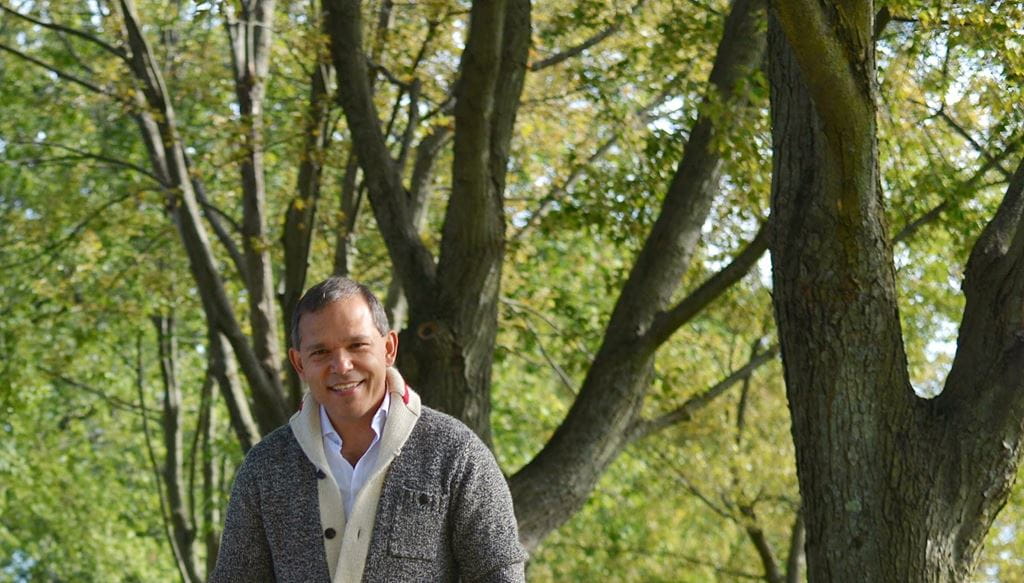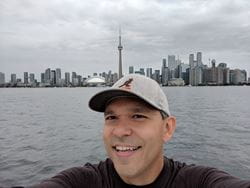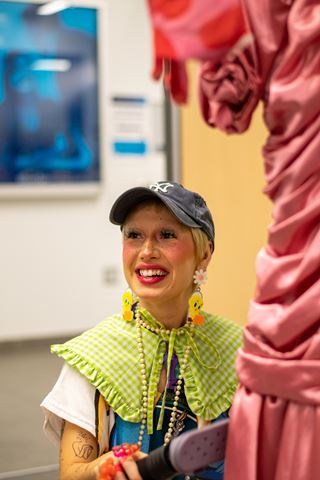
Saving water to the last drop
 by Vitusha Oberoi – Nov 18, 2021
by Vitusha Oberoi – Nov 18, 2021 The oldest of the recognized constellations in the skies is named Aquarius, or the Water Bearer. It’s a moniker Iman Hashemi (Mechanical Engineering Technology Design & Drafting ’04) has an easy claim to. For over a decade, Hashemi has been ensuring that water – the elixir of life that makes our blue planet a home to all living beings – remains a safe and renewable source despite the onslaughts of development and impacts of climate change.
Hashemi is Vice President of Innovation and Infrastructure Solutions at the Ontario Clean Water Agency (OCWA), which provides operations and maintenance services for over 820 water and wastewater facilities on behalf of municipalities, First Nations communities, institutions and private sector organizations in the province. Over 4.5 million people drink OCWA-treated water everyday. Hashemi oversees a broad array of services including engineering, capital delivery, process and energy optimization, asset management, resource recovery, piloting innovative technologies, and alternative delivery. He also develops partnerships across various government ministries, academic institutions, and the private sector to deliver initiatives to improve operational efficiency and reliability.
“We can do away with a lot of amenities in society, but provision of safe drinking water and wastewater management isn’t one of them.”
“It is humbling to know that the work we do touches millions of lives daily. What's so interesting about the water and wastewater sector is that it’s something many don't necessarily think about: you just expect to have safe water to drink, to shower, prep your meal, or water to flush your toilet. Water is a critical basic need, and it requires daily, short-and long-term strategic, regulatory, financial, and technical planning. It's quite special to work in this sector and be able to drive stakeholder engagement, innovation, and be able to influence it,” Hashemi says.
A sustainable future
It takes a large, passionate, and committed team that works around the clock, managing a complex infrastructure and intricate systems worth billions, to ensure that every drop that reaches people is clean and safe, he says. At OCWA, Hashemi uses his management and technical leadership skills, and experience in water and wastewater treatment technologies to lead his teams to provide safe water to communities. At the same time, he is constantly leading the team to find new ways to optimize energy usage, enhance climate change resiliency, evolve wastewater management toward resource recovery, evaluate and pilot innovative technologies, and put in place strong asset management programs to protect and optimize the systems used in water treatment .
“Sheridan’s students are supported by a strong faculty. They have access to a strong program that bridges students with industry through internships, summer programs and co-op opportunities.”
“At the end of the day, these are equipment and processes operated by our most important resource – our people – and the recent pandemic has shown us how we must innovate to manage risk and keep these systems running efficiently under all circumstances. It has shown us the critical importance of our people’s work to ensure system reliability. We can do away with a lot of amenities in society, but provision of safe drinking water and wastewater management isn’t one of them,” he says.
“We have some of the most amazing sources of water in Canada and we're just lucky with that. I think more than ever, we need to be very careful in protecting our source water,” he says.
A critical piece in safeguarding water, Hashemi says, is to treat water and wastewater as a single resource through the lens of a complete water cycle. “It’s really about being innovative and having a strong imagination and a strong vision to shape a future that is more sustainable and resource recoverable. It is quite exciting and energizing to be here, and to be a part of it,” he says.
Leap of faith to reach goals 
Although he’s found his true passion through his work, Hashemi says he didn’t set out to work in the water and wastewater sector. His initial plan was to be in the automotive sector owing to his interest in mechanical design. However, soon after graduating from Sheridan, he got an excellent opportunity to work for the General Electric Water and Process Technologies (GE) as a Commissioning Field Service Representative. The role offered him the opportunity to travel across North America and abroad, commissioning municipal and industrial systems.
“The work was exciting. It brought into focus issues of environmental sustainability and the many interconnected disciplines that shape the development of a solution. There was also this passion for climate change stewardship, for protecting and safeguarding people’s health by providing safe drinking water, and protecting the environment from impacts of the wastewater systems,” he says.
Five years after his graduation from Sheridan, Hashemi took what he calls ‘a leap of faith.’ He quit his job and returned to school for a master’s degree in engineering at the University of Toronto to study environmental decision-making, sustainable infrastructure development, energy efficiency, renewable energy, and water treatment.
“At the end of the day, these are equipment and processes operated by our most important resource – our people – and the recent pandemic has shown us how we must innovate to manage risk and keep these systems running efficiently under all circumstances.”
The September he returned to school after leaving his role, a global recession set in, but he chose to live with financial uncertainties as he was determined to broaden his education. Luckily, GE hired him again after his graduation, this time to work as a commissioning consultant for a large wastewater treatment project in Seattle. He spent a year shuttling between Toronto and the U.S., gaining invaluable experience and the opportunity to apply his education and learning to water and wastewater management. Soon after, he joined OCWA and has been contributing to its work and expanding his experience for the last 10 years in various technical and managerial roles. He attributes his success to staying open to opportunities, building cross-functional teams, and to his constant desire to learn and to contribute.
“There is no script for life and your plans are as good as your confidence in those plans, so keep on learning, contributing to your community and developing yourself,” he says.
Sheridan taught resiliency
Hashemi says while his career goals evolved over time, his education at Sheridan is at the root of his success as a professional because it focused on practical problem solving. “At Sheridan, we were taught to bring a practical lens to complex problems and to break things down so that we could figure out what the priority is, or what we should really focus on. And we were taught to learn from our mistakes, and ask the right questions. That’s what I practice till today,” he says.
In addition to helping him develop a solution-oriented mindset, Sheridan also taught him the importance of resiliency. “We were challenged through the course work, through assignments, through presentations, learning how to best work in teams, and through co-op opportunities. Once out of college, every day is an exam and one must have the resiliency to fail, and then to try again having learned from the failure.”
The water and wastewater sector in southern Ontario is a hub of excellence in the context of technology providers and innovators, Hashemi says. “I think this sector is one of the most exciting places to be in. Every technical discipline plays a role in building a water and wastewater system. There's just so much good work happening in the industry and it’s going to continue with the policies and frameworks that have been put in place to support this,” he says.
Hashemi is keen to share his learning and experience to benefit Sheridan’s students and recently joined the College’s Chemical & Environmental Sciences Professional Advisory Council.
“Sheridan’s students are supported by a strong faculty. They have access to a strong program that bridges students with industry through internships, summer programs and co-op opportunities. As a student, it means the world to sit across the table from professionals and exchange ideas.” he says.
Photo on top: Iman Hashemi (Mechanical Engineering Technology Design & Drafting ’04) is Vice President, Innovation and Infrastructure Solutions at the Ontario Clean Water Agency (OCWA).
Media Contact
For media inquiries, contact Sheridan’s Communications and Public Relations team.



